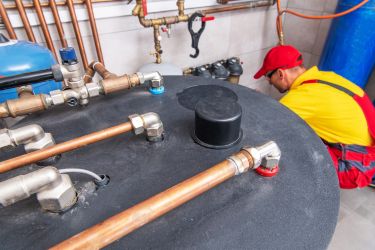
Written by Kayla Jane Barrie Updated on Dec 10, 2025 6 mins read

Hot water tanks are often an overlooked aspect of our homes. We turn on the tap and have hot water when we need it. But hot water tanks are doing all the work.
According to a government report on water heat usage, Canadians use an average of 75 litres of hot water at home, every day. From washing dishes, doing laundry, cleaning, and bathing, hot water tanks play an important role in our home life and provide a reliable source of hot water.
In this guide, we’ll explain how they work, maintenance tips, and if a repair or replacement is necessary, if home insurance covers it.
A hot water tank is a large, cylindrical water tank with a heating element inside, designed to hold and heat the water. On average, they hold around 200 litres of water. The tank is connected to a heating source, such as a boiler or immersion heater, which heats the water to the desired temperature. Once the water has been heated, it is stored in the tank until it is needed for household tasks.
There are a few different types of hot water tanks, which use different methods and fuels to heat the water. Gas heaters (fuelled by natural gas or propane) are the most popular. Electricity, oil, and solar-powered tanks are other options.
When water enters the tank near the top, it makes its way to a dip tube in the bottom, where it is heated to the target temperature. The heated water will rise to the top, where it then enters the hot water pipe and to the tap.
While hot water tanks are generally safe, they can be a potential source of damage to your home.
For example, if the tank is faulty or poorly maintained, it can leak or burst, causing damage to your home and belongings. This can result in costly repairs and even lead to mould growth if not addressed promptly. Accidents resulting from poor maintenance are not typically covered in most policies, even with additional coverage such as water damage insurance.
Another risk associated with hot water tanks is the potential for fire or explosion. If the tank overheats or malfunctions, it can ignite flammable materials nearby, potentially causing a fire. In rare cases, the tank can even explode, causing serious damage to your home and posing a significant risk to your safety. This is another reason to make sure you have enough fire insurance for your property.
Depending on your policy, you could receive financial support for damages related to water, fire, or electrical damage from an accidental hot water tank. It's essential to read your policy carefully and review it for any exclusions or limitations. Renters insurance will declare specific limitations regarding what you can claim. It will also specify how much coverage you have for any belongings that are damaged from a claim.
For example, some policies may only cover damage caused by sudden and accidental leaks rather than gradual leaks caused by wear and tear. Similarly, some policies may have limits on the amount of coverage, so it’s important to check what your plan outlines.
It's also worth noting that some insurers may require you to have your hot water tank regularly maintained and inspected to qualify for coverage. This is because regular maintenance can help prevent potential issues and reduce the risk of damage to your home.
Policies can also differ if you rent your hot water tank. Companies such as Reliance offer protection plans for maintenance and some repairs. Note that this does not act as an active insurance plan for your home or an endorsement for insurance.
Yes. When applying for home insurance coverage, your insurer will ask about the age of your hot water tank. They will want to know when it was last replaced and the type of tank.
Here is a look at the most common concerns with hot water tanks and what you can do to address any problems:

It is always best practice to contact a licensed professional to do any repairs or check-ups on your hot water tank. If you happen to damage the tank, there is less of a chance for insurance to help you with any financial support in the event of a claim, since it was not accidental. If you are buying an older home, make sure you have paperwork related to the current model and maintenance of the hot water tank.
If you live in a high-rise, you’ll want to clarify how your condo insurance will be impacted by the type of tank and will be excluded if there is a claim.
If you’re looking to invest in a new water tank or want to learn more about the one you currently have, here is an overview of the types of hot water tanks in Canada.
Investing in a new hot water tank can be a big decision. Here are some expert tips to help you in the buying (or renting) process.
With proper care and maintenance, hot water tanks can last up to ten years. Here are some maintenance tips to help extend the life of your tank:
Depending on the claim, your home insurance may cover hot water tank replacement. There are always exclusions, so check with your provider to know what will be included in the event of an accident.
Although Kitec plumbing was not officially recalled, many experts recommend that homeowners replace this plumbing system to avoid costly water damage and repairs.
If the tank is old or has not been flushed in a while, it may be full of sediment that makes its way to your tap, which could make it less clean compared to a new and clean water tank. Hot water is more likely to leach minerals, which can give water an off-taste. Use cold water for cooking and drinking instead.
On average, hot water tanks should be set at 60 °C or 49 °C (140 °F or 120 °F). Always check the manufacturer’s manual. It’s essential to note that water at 60 °C can kill more bacteria, but it can also cause burns in seconds and requires more energy. Ensure you have mixing valves installed to lower the temperature of the water as it comes out of your tap.
On average, a hot water tank can cost between $1,000 and $2,000, depending on the size, heat source, and material you buy. If you are looking to rent a hot water tank, the cost can range from $20 to $40 per month, depending on the company and whether you opt for any additional protection plans.
Hot water tanks are an important part of many households and something to consider when you are determining your home replacement cost. It's important to ensure that your hot water tank is properly maintained and inspected, and that you have sufficient coverage to protect against potential accidents and damages. If you have any questions or concerns about your policy and hot water tanks, speak to ThinkInsure today.
| Categories | Home |
|---|---|
| Tags | Home MaintenanceProtect Your Home |
Read our insurance blog to get helpful tips, information and news.
Find out if a seatbelt ticket will raise your car insurance rates and how insurers view seatbelt violations.
Ontario’s Project CHICKADEE dismantled a $25 million auto theft ring. Discover how this massive bust targets export enablers and what it means for rising Canadian insurance premiums.
Think refusing a breath test helps your case? In Ontario, it results in a minimum fine of $2,000 and a criminal record. Compare the penalties and protect your future.
Impaired driving in Ontario is a serious offence. Learn about impaired driving fines, penalties, statistics and other important information all drivers in Ontario need to be aware of before they get behind the wheel.